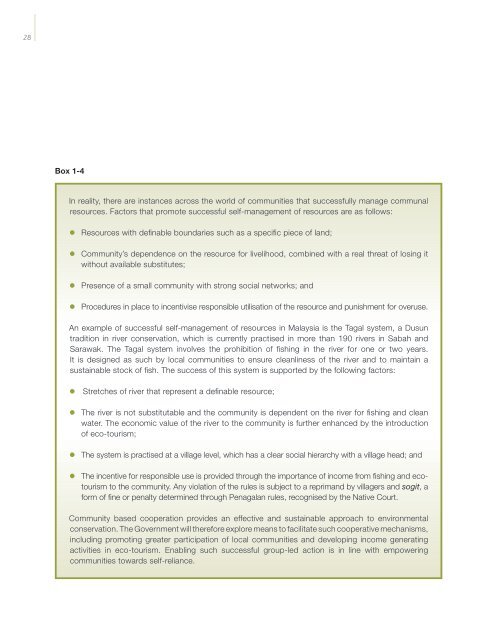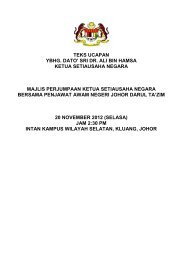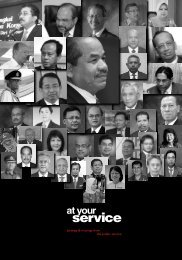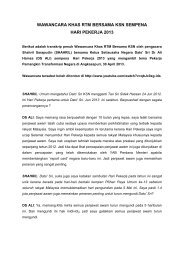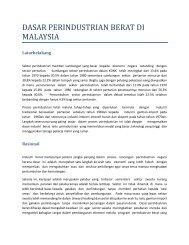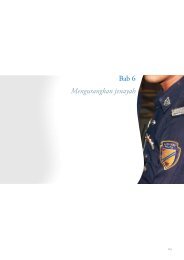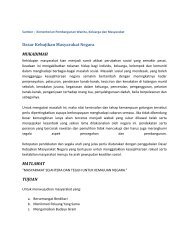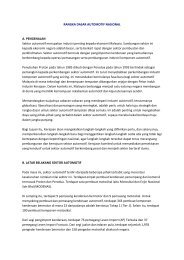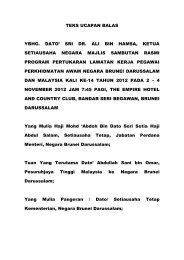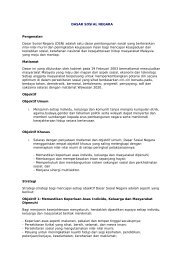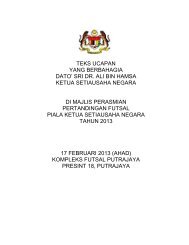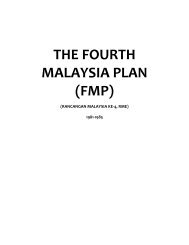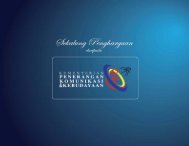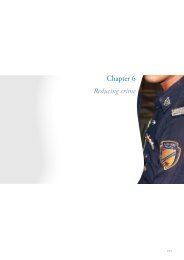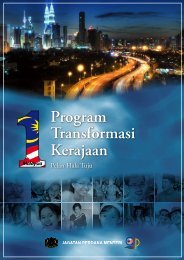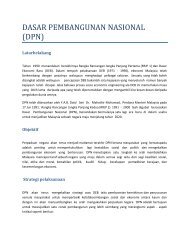- Page 2 and 3: MALAYSIA Published by THE ECONOMIC
- Page 4 and 5: iv For Malaysia to be a high-income
- Page 6 and 7: CHAPTER 1 CHAPTER 2 Table Of Conten
- Page 8 and 9: 10th Malaysia Plan Institutions 85
- Page 10 and 11: 10th Malaysia Plan Enhancing the Ec
- Page 12 and 13: 10th Malaysia Plan RAISING THE SKIL
- Page 14 and 15: 10th Malaysia Plan Developing a Lon
- Page 16 and 17: FEDERAL GOVERNMENT DEVELOPMENT ALLO
- Page 18 and 19: CHAPTER 1 CHAPTER 2 CHAPTER 3 List
- Page 20 and 21: CHAPTER 5 CHAPTER 6 10th Malaysia P
- Page 22: 10th Malaysia Plan xxiii
- Page 25 and 26: 2 Malaysia is emerging strongly fro
- Page 27 and 28: 4 Chart 1-2 performance of private
- Page 29 and 30: 6 Box 1-1 The Growth Report The Gro
- Page 31 and 32: 8 10 BIG IDEAS Internally driven, e
- Page 33 and 34: 10 Priority will be given to regula
- Page 35 and 36: 12 to Asia, and Malaysia lies at th
- Page 37 and 38: 14 3. TRANSFORMING TO HIGH-INCOME T
- Page 39 and 40: 16 4. UNLEASHING PRODUCTIVITY-LED G
- Page 41 and 42: 18 6. ENSURING EQUALITY OF OPPORTUN
- Page 43 and 44: 20 7. CONCENTRATED GROWTH, INCLUSIV
- Page 45 and 46: 22 Box 1-3 Reshaping Economic Geogr
- Page 47 and 48: 24 8. SUPPORTING EFFECTIVE AND SMAR
- Page 49: 26 9. VALUING OUR ENVIRONMENTAL END
- Page 53 and 54: 30 competition, such as with rankin
- Page 56 and 57: PLUS Expressway Chapter 2 BUILDING
- Page 58 and 59: 10th Malaysia Plan Chapter 2: Build
- Page 60 and 61: Chart 2-1 Real GDP growth slowed do
- Page 62 and 63: ut moderated sharply to a growth of
- Page 64 and 65: y 6.8% per annum during the Plan pe
- Page 66 and 67: overall budget deficit declining fr
- Page 68 and 69: genomic science, stem cells, biodie
- Page 70 and 71: This raised the proportion of acade
- Page 72 and 73: Measures undertaken to improve the
- Page 74 and 75: channelled into high performance sp
- Page 76 and 77: Table 2-1 World Economic Outlook, 2
- Page 78 and 79: Maintaining Full Employment During
- Page 80 and 81: Transformation Programme (GTP), whi
- Page 82 and 83: With trade in goods and services ac
- Page 84 and 85: Enhancing Efficiency of Fiscal Poli
- Page 86 and 87: Development expenditure will be an
- Page 88: The GTP was introduced in 2010 to t
- Page 91 and 92: 68 The Malaysian economy has turned
- Page 93 and 94: 70 • Putting in place world-class
- Page 95 and 96: 72 CREATING A PRIVATE SECTOR-LED EC
- Page 97 and 98: 74 • Undertake a cost-benefit ana
- Page 99 and 100: 76 services subsectors. This builds
- Page 101 and 102:
78 Table 3-1 Applying a business-ce
- Page 103 and 104:
80 SUPPORTING INNOVATION-LED GROWTH
- Page 105 and 106:
82 on key performance indicators (K
- Page 107 and 108:
84 Box 3-2 Catalysing innovation th
- Page 109 and 110:
86 An additional important institut
- Page 111 and 112:
88 C hart 3- 7 Government research
- Page 113 and 114:
90 RATIONALISING THE ROLE OF THE GO
- Page 115 and 116:
92 non-competitive assets of GLCs w
- Page 117 and 118:
94 DEVELOPING SMEs AS AN ENGINE OF
- Page 119 and 120:
96 and 57th respectively. During th
- Page 121 and 122:
98 will receive benefits such as ta
- Page 123 and 124:
100 COMPETING GLOBALLY Malaysia ope
- Page 125 and 126:
102 • Services Export Support. Fi
- Page 127 and 128:
104 greater use of ICT in the provi
- Page 129 and 130:
106 Empowering MIDA to Attract Inve
- Page 131 and 132:
108 ESTABLISHING WORLD-CLASS INFRAS
- Page 133 and 134:
110 Chart 3-16 Broadband coverage m
- Page 135 and 136:
112 upgrading works of Westport, Po
- Page 137 and 138:
114 achieving market pricing by 201
- Page 139 and 140:
116 FOCUSING ON KEY GROWTH ENGINES
- Page 141 and 142:
118 Focusing Corridors around Clust
- Page 143 and 144:
120 • Agriculture: To become a mo
- Page 145 and 146:
122 National Key Economic Areas Dur
- Page 147 and 148:
124 2) Palm oil and related product
- Page 149 and 150:
126 3) Financial services (continue
- Page 151 and 152:
128 5) Tourism Malaysia ranked 16th
- Page 153 and 154:
130 7) Education Private education
- Page 155 and 156:
132 9) Business services Between 20
- Page 157 and 158:
134 11) Agriculture In 2009, high v
- Page 159 and 160:
136 CONCLUSION The Malaysian econom
- Page 162 and 163:
Tabung Haji Tower Chapter 4 MOVING
- Page 164 and 165:
Inclusiveness will be addressed fro
- Page 166 and 167:
Table 4-1: Policy Instruments - Bef
- Page 168 and 169:
Box 4-1 10th Malaysia Plan Chapter
- Page 170 and 171:
Bumiputera have higher equitable em
- Page 172 and 173:
ELEVATING THE LIVELIHOODS OF THE BO
- Page 174 and 175:
Chart 4-4 Selected characteristics
- Page 176 and 177:
Box 4-2 The Low Income Households N
- Page 178 and 179:
identify the categories of workforc
- Page 180 and 181:
• Expanding micro-enterprise supp
- Page 182 and 183:
to effectively participate in the e
- Page 184 and 185:
subsidisation approach is not susta
- Page 186 and 187:
implemented to enable them to becom
- Page 188 and 189:
ENHANCING BUMIPUTERA ECONOMIC PARTI
- Page 190 and 191:
e categorised into micro and small
- Page 192 and 193:
types of investments, i.e. buy-outs
- Page 194 and 195:
MARA’s programmes will be supplem
- Page 196 and 197:
Promoting Bumiputera Representation
- Page 198 and 199:
Moving forward, the Government will
- Page 200 and 201:
as one of the National Key Result A
- Page 202 and 203:
and Indonesia (51.8%) as shown in C
- Page 204 and 205:
programmes in the public sector wit
- Page 206 and 207:
including providing monetary incent
- Page 208 and 209:
families, from being involved in so
- Page 210 and 211:
outcomes. Household and community l
- Page 212:
10th Malaysia Plan Chapter 4: Movin
- Page 215 and 216:
192 Human capital lies at the core
- Page 217 and 218:
194 Chart 5-2 During the Tenth Plan
- Page 219 and 220:
196 REVAMPING THE EDUCATION SYSTEM
- Page 221 and 222:
198 • Attract and develop top tal
- Page 223 and 224:
200 plantation areas, particularly
- Page 225 and 226:
202 • School Performance Rankings
- Page 227 and 228:
204 (New Deal) for head teachers an
- Page 229 and 230:
206 Chart 5-7 Significantly Improvi
- Page 231 and 232:
208 Box 5-3 • • Teach for Malay
- Page 233 and 234:
210 Implementing a Competency Based
- Page 235 and 236:
212 a new curriculum for secondary
- Page 237 and 238:
214 Box 5-4 Trust Schools: Public-p
- Page 239 and 240:
216 Mainstreaming and Broadening Ac
- Page 241 and 242:
218 channels such as television, ra
- Page 243 and 244:
220 an attractive career option. On
- Page 245 and 246:
222 technological developments in t
- Page 247 and 248:
224 Strengthening Industry and Rese
- Page 249 and 250:
226 Strengthening Performance Cultu
- Page 251 and 252:
228 continue to play a crucial role
- Page 253 and 254:
230 challenges of globalisation. Th
- Page 255 and 256:
232 leverage the availability of wo
- Page 257 and 258:
234 Chart 5-9 Chart 5-10
- Page 259 and 260:
236 During the Plan period, the Gov
- Page 261 and 262:
238 a significant source of untappe
- Page 263 and 264:
240 • To Catalyse. The TC will de
- Page 265 and 266:
242 CONCLUSION Human capital develo
- Page 268 and 269:
Pulau Pinang Bridge Chapter 6 BUILD
- Page 270 and 271:
ut also raise the quality of these
- Page 272 and 273:
Chart 6-1 Over 70% of Malaysia’s
- Page 274 and 275:
Moving forward, Malaysian cities fa
- Page 276 and 277:
Chart 6-3 Growth will be concentrat
- Page 278 and 279:
owned land and properties. The deve
- Page 280 and 281:
Open Spaces and Green Corridors Loc
- Page 282 and 283:
the number of theatre and music per
- Page 284 and 285:
• Expanding coverage of electrici
- Page 286 and 287:
Efforts under the GTP are already s
- Page 288 and 289:
policies, strategies and plans for
- Page 290 and 291:
of Johor. The project would be inte
- Page 292 and 293:
Ensuring the health and well-being
- Page 294 and 295:
have reached an ageing nation statu
- Page 296 and 297:
half of the Plan period. This will
- Page 298 and 299:
Increasing the Quality of Human Res
- Page 300 and 301:
ENSURING ACCESS TO QUALITY AND AFFO
- Page 302 and 303:
Implementation Coordination Unit an
- Page 304 and 305:
PROVIDING EFFICIENT PUBLIC UTILITIE
- Page 306 and 307:
Continuing Efforts to Restructure t
- Page 308 and 309:
Protecting Rivers from Pollution Mo
- Page 310 and 311:
Increasing and Diversifying Generat
- Page 312 and 313:
During the Plan period, the Governm
- Page 314 and 315:
eliable cleaning services. This is
- Page 316 and 317:
Box 6-3 The Crime NKRA is anchored
- Page 318 and 319:
Creating a Safer and More Secure En
- Page 320 and 321:
VALUING THE NATION’S ENVIRONMENTA
- Page 322 and 323:
Box 6-4 AFFIRM Framework 10th Malay
- Page 324 and 325:
Climate Mitigation: Reducing Malays
- Page 326 and 327:
Chart 6-20 Renewable energy will in
- Page 328 and 329:
turn will reduce the volume of wast
- Page 330 and 331:
Malaysia will intensify its efforts
- Page 332 and 333:
CONCLUSION At the heart of any nati
- Page 334:
10th Malaysia Plan Chapter 6: Build
- Page 337 and 338:
314 “There is a remarkable future
- Page 339 and 340:
316 DESIGNING PUBLIC SERVICES AROUN
- Page 341 and 342:
318 During the Tenth Plan period, e
- Page 343 and 344:
320 Initiative Description eKL expa
- Page 345 and 346:
322 Adopting a More Consultative Ap
- Page 347 and 348:
324 as well as over selection and d
- Page 349 and 350:
326 Combating Corruption for Effect
- Page 351 and 352:
328 offenders will be made public a
- Page 353 and 354:
330 regularly and transparently rep
- Page 355 and 356:
332 Shifting Funding from Physical
- Page 357 and 358:
334 During the Plan period, the Gov
- Page 359 and 360:
336 enable the Government to better
- Page 361 and 362:
338 • Implementing value-manageme
- Page 363 and 364:
340 RATIONALISING AND BUILDING CAPA
- Page 365 and 366:
342 generation of intellectual prop
- Page 367 and 368:
344 and raising the profile of the
- Page 369 and 370:
346 progression tracks, depending o
- Page 371 and 372:
348 particularly those with overlap
- Page 373 and 374:
FEDERAL GOVERNMENT DEVELOPMENT ALLO
- Page 375:
Chart FGA-2 Federal Government Deve
- Page 378 and 379:
356
- Page 380 and 381:
358 Appendix 1: Table 1 Ninth Malay
- Page 382 and 383:
360 Table 2 World Economic Outlook,
- Page 384 and 385:
362 Table 4 Gross National Income b
- Page 386 and 387:
364 Table 5 Gross Domestic Product
- Page 388 and 389:
366 KELANTAN State/Item RM million
- Page 390 and 391:
368 PERAK State/Item RM million (in
- Page 392 and 393:
370 SARAWAK State/Item RM million (
- Page 394 and 395:
372 WP LABUAN State/Item RM million
- Page 396 and 397:
374 Table 8 Federal Government Fina
- Page 398 and 399:
376 Table 10 Population Size and Ag
- Page 400 and 401:
378 Table 11 Employment by Sector,
- Page 402 and 403:
380 Table 12 Employment by Major Oc
- Page 404 and 405:
382 Table 13 Student Enrolment in P
- Page 406 and 407:
384 Table 14 Enrolment in Higher Ed
- Page 408 and 409:
386 Appendix 2: Progress and Achiev
- Page 410 and 411:
388 Thrust 1: Moving the Economy up
- Page 412 and 413:
390 Thrust 1: Moving the Economy up
- Page 414 and 415:
392 Thrust 1: Moving the Economy up
- Page 416 and 417:
394 Thrust 2: Raising the Capacity
- Page 418 and 419:
396 Thrust 3: Addressing Persistent
- Page 420 and 421:
398 Thrust 3: Addressing Persistent
- Page 422 and 423:
400 Thrust 3: Addressing Persistent
- Page 424 and 425:
402 Thrust 3: Addressing Persistent
- Page 426 and 427:
404 Thrust 4: Improving the Standar
- Page 428 and 429:
406 Thrust 4: Improving the Standar
- Page 430 and 431:
408 Thrust 4: Improving the Standar
- Page 432 and 433:
410 Thrust 4: Improving the Standar
- Page 434 and 435:
412 Thrust 5: Strengthening the Ins
- Page 437 and 438:
GLOSSARY OF ACRONYMS
- Page 439 and 440:
GMP Good Manufacturing Practices GN
- Page 441:
PNB Permodalan Nasional Berhad PNS
- Page 444 and 445:
422 INDEX 1Malaysia, 9, 48, 90, 140
- Page 446 and 447:
424 G genuine partnerships, 25 gini
- Page 448 and 449:
426 Market-based pricing, 76 mean i
- Page 450 and 451:
428 158, 232 social safety net, 114


